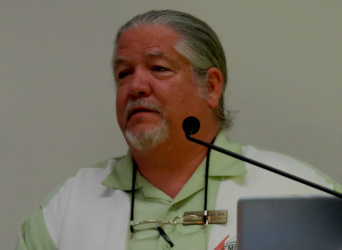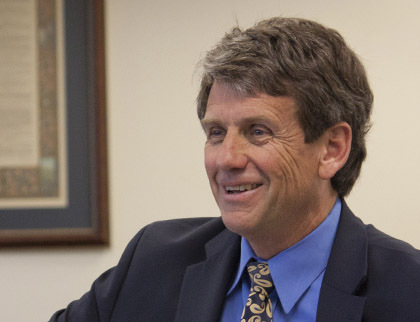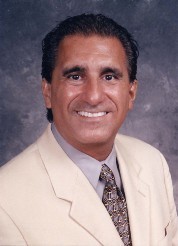Hemant Mehta's Blog, page 1968
July 26, 2014
Microscope Technician Claims in Lawsuit That He Was Fired for Being a Creationist
In 2009, Mark Armitage (below) was offered a part-time position as an Electron Microscopy Technician at California State University Northridge. It wasn’t a teaching position or anything, so the fact that he was a Creationist (and said as much during his interview) seemed irrelevant.

In 2012, after years of seemingly successful work in his position, he was asked to teach a class on Biological Imaging to graduate students. Again, his Creationist beliefs didn’t make a difference. (A microscope works whether or not you accept evolution.) I guess it also didn’t matter that his degrees came from Liberty University and the Institute for Creation Research.
Armitage was invited that summer to go on a dinosaur dig at the Hell Creek Formation in Montana. While there, he happened to uncover “the largest triceratops horn ever recovered from that site.” When Armitage studied the fossils back in his lab, he discovered something amazing: There were soft tissues present. There was no way that a 68,000,000-year-old fossil could have had any soft tissues still around — those tissues take no more than a million years to decay, tops.
So Armitage offered a different explanation: The fossil was much younger than we ever anticipated. Forget millions of years; think a few thousand. It was proof of Creationism! Somewhere, Ken Ham began dancing.
(I suppose now is a good time to point out that there actually is a very good explanation for how soft tissue in dinosaur bones could have survived: Iron in their bodies may have protected the tissue before it decayed.)
But just ignore that. Where were we? Oh, right. PROOF OF CREATIONISM!
Armitage began talking about the supposed Young Earth implications of his findings in his classroom, and word got back to Dr. Ernie Kwok, a biologist at the university. Armitage alleges that Kwok shouted at him, “We are not going to tolerate your religion in this department!!” (Which is a strange thing for Armitage to claim, since I didn’t know you could tell when someone verbally used two exclamation marks in a sentence.) No actions were taken against Kwok after this happened.
Armitage got his findings accepted in the journal Acta Histochemica the following January and published later that summer. (In case you’re wondering how that happened, the paper made no mention of Creationism, God, Intelligent Design, the age Armitage believed the tissues to be, or anything remotely controversial.)
Despite all this, He was fired at the end of the February. Armitage says in a recently-filed lawsuit that Kwok convinced his employers to get rid of Armitage because of his Christianity and that constitutes religious discrimination and violates his academic freedom rights. The school says Armitage was a great employee, but his appointment had always been temporary, there was a lack of funding, and his Creationism had nothing to do with his termination.
(I suppose now is a good time to point out that Armitage once wrote a book called — and I’m totally serious — Jesus is Like My Scanning Electron Microscope.)
There’s really no smoking gun in the lawsuit that proves Armitage was fired because of his Creationist beliefs. Just a lot of hearsay and conspiracy theories.
This seems like a very simple case to decide. A guy lost his part-time job and he’s upset, so he’s looking for any justification he can find. Meanwhile, California is an “at-will” state; if you’re hired in a position like the one Armitage had, even if you’re very good at it, your employer can fire you at any time, with or without cause. The school has the upper hand no matter how you look at it.
This lawsuit won’t go anywhere, I suspect, but I doubt that’ll stop Armitage from holding up the banner of a Christian martyr, fired for his sincere beliefs… even though his biggest claim to fame has a perfectly natural explanation.
(via Religion Clause)
After Priest Dies, His Obituary Omits the Fact That He Was Kicked Out of the Ministry for Sexually Abusing Children
Rev. Robert H. Purcell (below) died last week and several newspapers published a notice of his passing. It (unsurprisingly) mentioned the highlights of his life:

… Purcell, a former pastor of Sacred Heart Church in Margaretville, New York, who was responsible for fostering an interfaith initiative throughout the Catskill community, died Thursday, July 17, 2014.
Because of his ecumenical efforts, our region was blessed with good will and mutual respect among various religious factions. Friends enjoyed by the father were not exclusively Catholic parishioners, and his annual Passover celebrations were enormously popular.
…
Beloved as a counselor and spiritual mentor to his flock, Father Bob always had uplifting words of reassurance for those seeking guidance.
One parishioner summed up the feelings of many. Having suffered the devastating loss of his wife in a tragic accident, the gentleman shared his feelings with a friend, commenting, “Fifteen minutes with Father Bob is better than hours of conversation with a therapist.”
It goes on like that for a while. Lots of good stuff.
But there was one glaring omission: In 2011, Purcell was kicked out of the ministry after it was discovered that he sexually abused children.
In its investigation, the Diocese “found reasonable grounds to believe” that Purcell sexually abused minors, including a victim in Margaretville from 1995 to 2001, according to Ken Goldfarb, the director of communications for the Roman Catholic Diocese of Albany…
They left that little tidbit out of the obituary.
Was it journalistic malfeasance? Well, depends on how you look at it. Media watchdog Jim Romenesko explains:
“This was a paid obituary,” Glens Falls Post Star editor Ken Tingley tells me. “Editorial employees have no control over the content in those obits. They are not reviewed by us or edited by us.“
To their credit, the Roman Catholic Diocese of Albany, where Purcell worked, condemned the omission regardless, saying that it was unfair to his victims that his full history not be told:
A recent obituary for Robert Purcell of Roxbury has disturbed us deeply, primarily out of empathy and concern for persons who may have suffered as a result of sexual abuse by a member of the clergy. The Roman Catholic Diocese of Albany discourages any celebration or publicity that would make reference to the former status as priest or deacon of a person who was removed from his ministerial position following the conclusion of an investigation into the allegation.
Diocese Director of Communications Ken Goldfarb even added that Purcell would not be dressed in clerical clothing during his funeral because he was permanently removed from his position. That wasn’t the only way they were distancing themselves from him:
“The words ‘Father’ or ‘Reverend’ are not supposed to be used in an obituary,” Goldfarb said. “We were not consulted in any way concerning the obituary, and that we were totally unaware of its contents until it appeared in print.”
“This is the first situation that we’ve encountered where an obituary ran contrary to our policy,” he said. “We are reviewing our policy to determine how we might be able to avoid this circumstance in the future.”
Wow. I have to say, that’s a welcome sign from Church officials. It’s not often we hear about them doing the right things in the wake of an abuse scandal, but this reaction to Purcell’s death — made without malice, but with a focus on his victims — struck exactly the right note.
What Part of “Thou Shalt Not Steal” Do You Not Understand?
Orville “James” Morris, a bank robber from Indiana, was finally caught on Thursday. What’s notable isn’t his awful disguise (“curly, black wig and a fedora”) but the shirt he was wearing when he was finally taken into custody:
(via The Salem Leader)
Jesus saves. But Morris steals.
(Thanks to Blaine for the link)
July 25, 2014
Why Isn’t One Million Moms Doing Anything About This?
If a TV show or commercial portrays gay people as normal human beings, the conservative Christian group One Million Moms (with their fewer-than-70,000 Facebook likes) flips out and demands a boycott or repeal.
But this video game ad on Facebook, which depicts God as an evil killer?

Not a peep.
And, to be fair, there shouldn’t be. It’s just a game, not a formal critique of religion. But neither are a lot of the TV shows and other forms of “entertainment media” they go after. What these groups choose to ignore says as much about their priorities as what they target.
Another reason they might not go after it? The ad is totally accurate. God’s kill count in the Bible is huge.
(Thanks to Alan for the link)
Why is the “King of Homeschooling” Trying to Block a Treaty Regarding the Rights of the Disabled?
I really, really dislike Michael Farris. He’s (partially or wholly) behind a lot of things that are holding our country back in terms of basic human rights issues, and it’s just mind boggling sometimes to connect the dots on these stories.

Farris, if you don’t know, is the founder of the Home School Legal Defense Association (a group that supposedly advocates for the rights of homeschoolers, but really mostly just advocates for the right of parents to abuse their kids without state intervention), the founding president of Patrick Henry College, and prime mover (after Phyllis Schlafly) from keeping the U.S. from ratifying the Equal Rights Amendment and the Convention on the Elimination of All Forms of Discrimination against Women (CEDAW), because it would, supposedly, challenge traditional marriage (his daughter’s courtship story is featured in this terrible dating book, so, that tells you more about what he thinks of women). And, according to the eccentric basement blogger and Christian homeschool dad Kevin Swanson, Farris is “the king of homeschooling.”
So that’s Michael Farris. You might be wondering: What’s he up to these days?
Just trying to keep the U.S. senate from voting in favor of participating in the UN Convention on the Rights of Persons with Disabilities, because he thinks it’ll let the UN and the U.S. government give kids more rights than he thinks they should have. Remember, this guy drafted the “Parental Rights Amendment” because he wants to keep the government out of regulating religious homeschoolers. And that’s his motivation here: keep the U.S. from ratifying the treaty to keep the feds from having too much oversight over homeschooling parents.
He’s worried that it’ll push the U.S. closer to ratifying CEDAW or the UN Convention for the Rights of the Child (which he objects to because it would eliminate spanking as abusive and basically overturn all his work on parental rights) — and rightly so. But our lack of international participation in these human rights treaties means we’re keeping ourselves in the ethical dark ages. The other nations that haven’t ratified CEDAW include Sudan, South Sudan, Somalia, Iran, Palau, and Tonga.
Former Republican presidential nominee Bob Dole is trying to get the UN Convention on the Rights of Persons with Disabilities pushed through the Senate one more time, and he’s up against Farris, who, as stated, is a staunch opponent to the rights of the underdog.
According to Politico, Farris is optimistic about his prospects:
“We still think we have more than enough votes to kill it on the floor of the Senate,” Farris said. “We’ve got grass-roots activists who will stand up and speak on this issue.” He’s sent an action alert to the 170,000 home-school parents in his association to contact their senators and talk to their communities about the treaty.
“The question is: How many Republicans are going to lose their spines?” Farris said.
Bad choice of words, perhaps, given the nature of the treaty.
Farris’ scare tactics have proven successful time and again. He’s got good reasons to be optimistic — and we can give him credit for yet one more human rights battle lost in the U.S. because of his religious views and fervor.
The Cranston High School West Prayer Banner Has Inspired a Lawn Ornament…
I thought we had heard the last of the Cranston High School West prayer banner. Jessica Ahlquist won her lawsuit, the banner was placed in a secret underground lair, and everyone was finally supposed to move on.
I guess someone in Riverside, Rhode Island wants to remember the good old days. Steve Ahlquist, Jessica’s uncle, writes that he spotted a replica of the prayer banner affixed to a telephone pole (on private property, so it’s legal):

… this is, in my opinion, an odd choice for a lawn decoration. Personally, I would have gone with the Garden Gnomes.
Those gnomes would’ve certainly been more pleasant to look at…
Does anyone have a clue what “CLIT” is supposed to mean in this context? (I assume it’s not vandalism.)
(Thanks to Richard for the link)
Teacher-Led Prayer Halted in Indiana Middle School After a Parent Speaks Up
On May 27, the top ten students in every grade at Sarah Scott Middle School (in Indiana) gathered for an awards banquet. One of the teachers at the school, Jeffrey Burress, began the celebration by doing what he did the previous year: He said a prayer. All the award recipients along with the student council members who were there were expected to bow their heads.
Thankfully, a parent of one of those students alerted the Freedom From Religion Foundation to the problem. The FFRF’s Sam Grover send district Superintendent Daniel Tanoos (below) a letter reminding them of the law and demanding they put a stop to the constitutional violations:

The District should make certain that teachers in its schools are not unlawfully and inappropriately indoctrinating students in religious matters by encouraging them to engage in prayer. Schoolchildren already feel significant pressure to conform from their peers. They must not be subjected to similar pressure from their teachers, especially on religious questions. Considering the young age of the students, concern over religious coercion and proselytization should be especially high in middle schools.
The District must make certain that future school-sponsored events do not contain prayer and that all District staff are reminded of their constitutional duty to remain neutral toward religion while acting in their official capacities. We request an immediate investigation and response in writing informing us of the steps you are taking to end this serious constitutional violation.
You would think the Vigo County School Corporation would’ve put up a fight — many districts do — but even their attorney was thinking, “Yeah, you caught us. We have no defense here.”
The School Corporation has investigated the matter and does acknowledge that on May 27, 2014 there was an end of year banquet in which a teacher led a prayer with students present.
I’m writing to inform you that the School Corporation has informed each building Principal that teacher-led prayer with students present will cease, as it is prohibited by the Constitution and should not be allowed.
Wow… That was relatively easy. However, Tanoos still doesn’t seem to understand what all the fuss was about:
“Now we have to live within the law, which I’ve understood but never thought someone would complain about, a teacher leading a prayer,” Tanoos says.
That Tanoos thinks no one would ever complain about a teacher-led prayer is a sign of why it’s a problem. I know it’s hard for him to understand — he’s only the highest ranking person in the district — but not all students believe in his God. All he has to do is imagine a teacher telling captive students “God isn’t real!” to figure out why religion should be left out of public school celebrations altogether.
But the bigger story may be this: The prayer happened last year and no one said anything. This year, a parent reached out to the FFRF, and the problem got fixed. If that parent stayed silent, the prayers would’ve likely continued indefinitely until the argument became, “Well, we can’t stop it now! It’s tradition!”
That’s why it’s so important for parents and students to speak up when they recognize these religious injustices. Nothing will change without them.
Atheist Billboard in North Texas Reaches Out to Hispanics
The Dallas–Fort Worth Coalition of Reason began a billboard campaign this week to reach out to Hispanics. The month-long campaign includes a billboard reading, “¿No Eres Religioso? ¡47 Millones Están De Acuerdo!” (Not Religious? 47 Million Agree!)

DFWCoR Coordinator Alix Jules explained that “Hispanics and Latinos, especially those in the younger generations, are beginning to question their religious upbringing like never before. But as in the Black community, leaving the Church can carry a high social cost.” To help connect nonreligious Hispanics and Latinos in Dallas, the DFWCoR Diversity Council is supporting the HSH in its mission to “promote the use of critical thinking and evidenced-based reasoning” in the Hispanic community.
The 47,000,000 number comes from the fact that nearly 20% of Americans are religious “Nones.” When you factor in the Pew Hispanic Center’s data saying Hispanics are 14% of the Unaffiliated group, we’re talking about nearly 7,000,000 non-religious people.
Jules hammers home what that means:
“That makes more nonreligious Hispanics than Republican Hispanics,” Jules noted. “As we head into a mid-term election cycle, that’s probably something about which all political parties, both nationally and here in Texas, should be aware.”
The billboard isn’t just all talk. The Fellowship of Freethought group in Dallas, along with the Hispanic Secular Humanists, will be boxing care packages this weekend for 2,000 refugee children who need the help.
July 24, 2014
Debunking Four Myths About Polyamory
This is a guest post written by Miri Mogilevsky. Miri is a graduate student in social work and the author of the blog Brute Reason, which covers psychology, mental health, and social justice from a secular perspective.
…
Polyamory — the practice of having multiple sexual/romantic relationships with the knowledge and consent of everyone involved — is currently going through that stage that all “alternative” lifestyle practices must go through: the one where journalists discover their existence and have a field day.
Luckily for them, more and more people are willing to openly talk about their open relationships as the stigma of being non-monogamous diminishes. Journalist Olga Khazan interviewed quite a few of them in this article for The Atlantic. While the article is well-researched, balanced, and accurate overall, it (probably unintentionally) repeats and propagates a few tropes about polyamory that aren’t always accurate.
Note that I said “not always”; tropes are tropes for a reason. There are plenty of people whose polyamorous lives resemble them, and I mean it when I say that there’s nothing wrong with that (as long as it’s all consensual!). But I think that the (presumably non-poly) audience these articles are aimed at might benefit from seeing a wider variety of poly experiences and opinions, so I wanted to add my own voice.
With that in mind, here are a few dominant narratives about polyamory that aren’t always true, but that crop up very often in articles about polyamory.
1. Polyamorous people don’t feel jealousy.
It’s right there in the title, “Multiple Lovers, Without Jealousy.” Although the article does later go more in-depth about the ways some poly couples experience and manage jealousy, the headline perpetuates the common myth that polyamory is for a special breed of human (or superhuman, perhaps) who just “doesn’t do” jealousy.
Some do, some don’t. For some poly folks, jealousy is a non-issue. For others, it’s an annoyance to be ignored as much as possible. For still others, it’s a normal, natural emotion to be worked through and shared with one’s partners. There are as many ways to deal with jealousy as there are to be polyamorous — and there are many.
The reason this matters is because framing jealousy as a thing poly people just don’t experience drastically reduces the number of people who think they could ever be poly. I’ve had lots of people say to me, “Oh, polyamory sounds cool, but can’t do it because I’d be jealous.” Of course, dealing with jealousy isn’t worth it for everyone, so I completely respect anyone’s decision to stick with monogamy because of that. But I think it’s important to let people know that you can experience jealousy — even strong and painful jealousy — and still find polyamory fulfilling and completely worthwhile.
2. Bisexual people try polyamory because it’s not fulfilling to only date a person of one gender.
Some do, yes. But this also ties into an unfortunate, harmful, and inaccurate myth about bisexual people: that they will inevitably cheat on you because they “need” to be with someone of another gender. Myths like these, in turn, contribute to prejudice and discrimination against bisexual people, who may face such hurtful attitudes both from the straight majority and from gays and lesbians.
For many bisexual people, the gender of their partner isn’t nearly as essential a factor as others seem to think it is. We may notice it, sure, but we don’t sit around thinking, “I’m very glad that I’m dating both Suzie and Tom because Suzie is a girl and Tom is a boy!” It’s just like you can be attracted to blondes, brunettes, and redheads, without necessarily feeling stifled and unfulfilled if you’re only dating brunettes at a given point in time.
3. Polyamory involves multiple serious, committed, capital-R Relationships.
Poly folks themselves sometimes repeat this trope to counter the assumption that polyamory is just about wild, carefree, casual sex with as many people as possible. However, the fact that that assumption is usually made with a negative connotation by monogamous people doesn’t mean there’s anything wrong with doing non-monogamy that way.
There’s also nothing wrong with doing something in between — meaningful, often-close partnerships with people that don’t necessarily involve long-term commitment, cohabitation, or marriage. Some people call this “solo polyamory,” because the emphasis is not on any central couple(s), but on the individual. People who practice solo polyamory tend to value independence and often reject the idea of labeling their partners “boyfriend,” “girlfriend,” or other terms that suggest commitment.
But that doesn’t mean that solo poly relationships are “casual” or “meaningless,” either. Some experience them as very close friendships that also happen to involve sex. Others have romantic feelings towards their partners, but aren’t interested in the “relationship escalator” of constantly increasing intimacy and commitment.
Many people who practice solo polyamory find that their experiences and issues aren’t much-discussed in the poly community, which is focused more on couples and the challenges and triumphs that they may experience within open relationships. This could be a reflection of the fact that many people come to polyamory after having been monogamous for their entire adult lives up until then, and the couple unit can seem more comfortable and easier to manage. For some, it is, and it’s completely worth it. For others, that aspect of traditional relationships just doesn’t appeal.
4. People choose polyamory so that they can get something from one partner that they can’t get from another.
Think of this as the general case of the bisexuality trope I mentioned earlier. Many people think that polyamory happens when a monogamous couple discovers that they can’t provide something for each other (kinky sex, frequent-enough sex, being of a certain gender) and realizes that they need to find other partners to provide for the missing needs.
As with the other tropes, this is certainly true sometimes, and more power to people who are able to maintain a healthy and happy relationship rather than breaking up because they decided to try polyamory. However, for other poly people, it’s less about getting particular needs met than about… well, we fall for multiple people. I can’t necessarily point to certain things that certain partners of mine provide that others can’t. I didn’t start seeing them because they met a previously unmet need. I just met them and we clicked.
Poly people sometimes say, “You can’t fix a broken relationship by adding more people.” I’ve found this to be true, and that’s a danger when you believe that other partners can provide what your existing partner(s) cannot. Some people find, much to their disappointment, that it’s not just that they wanted kinky sex or dates that involve skydiving — they wanted those things with that particular partner, and if they can’t have it, they can’t be happy in the relationship.
…
Overall, Khazan’s article is a comprehensive and interesting introduction to the history, culture, and practice of polyamory. My only serious quarrel with it is the inclusion of some dubious evolutionary psychology. She cites a researcher and uncritically claims that “most people aren’t biologically predisposed to share their lovers,” because, you know, it’s not like the cavemen did it.
What I’ve found from studying psychology in general is that evolutionary psychology in particular is rarely good science. Its hypotheses are rarely falsifiable, and it allows any researcher with sufficient creativity to invent a plausible-sounding explanation for just about any phenomenon in human behavior. Many studies from evolutionary psychologists merely show that a phenomenon exists, and then assume that that phenomenon has an evolutionary origin. In fact, most of our behavior is probably caused by an interplay of genetics, socialization, culture, and other factors that are too complex to distill into a statement like “most people aren’t biologically predisposed to share their lovers.”
However, most polyamorous people probably don’t care very much whether or not our relationships go against our “hard-wiring.” We enjoy them, they’re fulfilling, and we wouldn’t have it any other way.
(Image via Shutterstock)
No, an Ohio State Class Did Not Teach That Christians Are Dumber Than Atheists
According to an article on the conservative site Campus Reform, a recent online quiz for a Psychology 1100 class at The Ohio State University asked students:
Theo has an IQ of 100 and Aine has an IQ of 125. Which of the following statements [would] you expect to be true?
- Aine is an atheist, while Theo is a Christian.
- Aine earns less money than Theo.
- Theo is more liberal than Aine.
- Theo is an atheist, while Aine is a Christian.
Correct answer? Aine (with a higher IQ) is an atheist, while Theo is a Christian.
Assuming nothing here is doctored, it just strikes me as a horribly written, too-simplified-to-be-useful question.
It’s true that a research paper published last fall said there’s a negative correlation between religiosity and IQ — the higher your IQ, the less religious you were — but even the researchers didn’t jump to the conclusion that the quiz question suggests:
But [psychologist Miron] Zuckerman is careful to point out that his work — known as a “meta-study” because it examines a range of other studies — does not mean only dumb people believe in God.
Rather, he said, it shows only that more intelligent people may have less need for religion.
“It is truly the wrong message to take from here that if I believe in God I must be stupid,” he said. “I would not want to bet any money on that because I would have a very good chance of losing a lot of money.”
…
“We say it is possible that having a high level of intelligence provides similar functions to what religion provides” for people who adhere to a religion, Zuckerman said.
It’s also true that countries that are more atheistic tend to have higher average IQs. However, averages say very little about individuals and the quiz question simplifies the data so much that it becomes flat-out weird. (What do we really know about Theo and Aine? Next to nothing.)
Each dot represents a country’s (lack of) religiosity and the national average IQ
Kaitlyn Schallhorn at Campus Reform says that the quiz may have been created by a teaching assistant, not the professor, and an unnamed employee in the psychology department told her students concerned about their grade could talk to someone in the department.
Here’s a simpler solution: Toss the question and have a discussion in class about how to properly interpret studies. There’s no evidence of anything nefarious going on, and it’s telling that Schallhorn never tells us what the textbook or professor actually said about the subject in question.
Still, she suggests there’s discrimination at play:
OSU explicitly prohibits discrimination on campus against any individual based on “age, ancestry, color, disability, gender identity or expression, genetic information, military status, national origin, race, religion, sex, sexual orientation, HIV status, or veteran status,” according to the university’s policy.
“Colleges will tolerate pretty much any religion other than Christianity,” the OSU student [who took the quiz] said. “If colleges really want to give everyone a fair shot, they should stay away from making comments about any religion.”
That has absolutely nothing to do with it. This isn’t about colleges being “liberal” or against religion. But no one tell University of North Carolina professor Dr. Mike Adams. He’s too busy auditioning for Fox News:
“So would it be permissible to force blacks to take a class teaching that blacks would have a lower IQ than white people?” he said in an interview with Campus Reform.
(How did this guy become a professor…?)
Look, a psychology or sociology class is a great place to talk about the benefits and drawbacks of religion. If there’s evidence of religion hurting us as a society, then we should talk about it. A college classroom is the perfect environment in which to challenge your beliefs, whatever they are. And if there’s reason to believe skin color affects your IQ, yes, it should be discussed, even in a required class. (Spoiler: Skin color doesn’t affect your IQ. But many other factors, like access to a quality education, do.)
None of that excuses the bad quiz question. But it’s not worth the big fuss. It’s a one-off question that should be simple to correct, so let the professor correct it (or get rid of it altogether). There’s no reason to jump to the conclusion that it’s somehow evidence of anti-Christian discrimination.
Hemant Mehta's Blog
- Hemant Mehta's profile
- 39 followers









